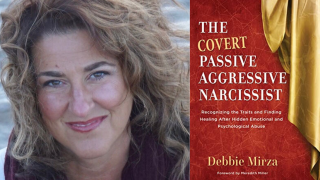Narcissism
Interview: Dealing With a Narcissist in Disguise
I thought I knew what narcissism was. Then I read a book that showed I didn't.
Posted May 8, 2023 Reviewed by Tyler Woods
Key points
- You can be with a covert narcissist for years, even decades, and not see through their behavior.
- Therapy is like training for covert narcissists because it shows them the right language to use.
- Covert narcissists are so skilled at manipulation that if you confront them, they can convince you that you're the problem.
- Improving a relationship with a covert narcissist can be impossible since harmony and love is not their goal.

You can’t go on YouTube, open a newspaper, or click on a link without hearing about narcissism. Every day, political figures and celebrities are diagnosed with the disorder by non-clinicians. Most of us feel quite clear about the traits, quirks, and characteristics of narcissism.
What society is less clear about is the covert type.
Because the covert type is, well, covert. He or she appears modest, charming, and self-effacing. It’s often someone who tells you how much they love you and whom others admire. They are so skilled at what they’re doing, in fact, that they may have convinced you that you’re the problem.
As someone who’s been in therapy for decades, spends numerous hours every week in 12-step recovery rooms, has written countless articles about mental health, and is endlessly fascinated by the human condition, I considered myself quite in-the-know about the various and sundry issues people could have.
But when I was describing a relationship with someone in my life and lamenting that no amount of work I did ever seemed to improve it—that, in fact, the more work I did and the better I got, the worse the relationship seemed to be—a friend asked me if I’d read The Covert Passive Aggressive Narcissist by Debbie Mirza.
I brushed the friend off, explaining that someone always recommended a book whenever I talked about this particular relationship, but no book, no 12-step program, and no therapist ever seemed to get it.
Nevertheless, I picked up the book, thinking it couldn’t hurt. And then I read it in one sitting, underlining every line I related to—which is to say, almost every line in the book. My entire life suddenly made sense in a way it never had before. I suddenly realized that I was not alone—other people had experienced this! Unfortunately, I also learned that covert narcissists, much like overt ones, don’t tend to get better.
I reached out to Mirza, the book's author, to tell her how transformational her book was for me, to see why she thinks covert narcissism isn’t discussed as much as its overt cousin, and, frankly, to get some direction.
This is a condensed version of our conversation.
Anna David: How did you first find out about covert narcissism?
Debbie Mirza: I was in a long relationship that became confusing and crazy-making during the years leading up to the discard. After someone in my life told me they thought I was with a narcissist and listed traits they were seeing, I began researching. But everything I was reading was about the overt narcissist. While some of the things rang true, not everything did. The person wasn’t flashy and obnoxious or overt. I hadn't really been yelled at or called names (although that changed during the final phase and continued after it was over, which is common). In fact, for many years I believed I was lucky to be with this person. To many people, we were “couple goals." That is one of the things that makes these relationships so confusing and shows how incredibly cloaked the abuse is.
AD: How is a relationship with a covert narcissist different from one with an overt narcissist?
DM: The emotional and psychological abuse is more hidden and insidious with a covert narcissist. The demeaning actions are more subtle and often go unnoticed. You can be with a covert narcissist for years, even decades, and not see through their behavior. Your life force energy slowly drains from you over time without you realizing it. A relationship with a covert narcissist can look normal. You can think it is normal, and after a while, you begin to believe you are not worthy of any better, even if you can’t put that into words.
AD: What are the main characteristics of a covert narcissist?
DM: They have the same traits as an overt narcissist, but their reputation is very important to them, so they learn to appear to not be narcissistic. For instance, they will act like they have empathy, but they don’t. You won’t actually feel it. They won’t show their rage through yelling, but instead through passive-aggressive ways. It’s fill-the-room anger, where your body feels frozen, but you think there’s something wrong with you. They won’t appear self-absorbed, but when you stop and look closely, you can see how they are. They may cloak it in, say, humanitarian work. They are often pillars of the community. They extract energy from those who adore them. That is one reason you feel so drained around them, but often attribute that to other things.
AD: What was it like for you when you found out about covert narcissism?
DM: When a coach said to me, “It sounds like you’re describing a covert, passive-aggressive narcissist,” it was like every hair stood on end—it was the chills of truth that your body feels. It was the puzzle piece I needed so I could start piecing things together. Then it started to make more sense. But it was still confusing; I'd watch YouTube videos and read articles but there weren't really any books at the time I could find about it.
AD: Why do you think there isn’t adequate information out there about covert narcissism?
DM: I've come to see this is a fairly new discovery in the world of psychology, and I've talked to many licensed therapists who tell me this was not a part of their training. My best friend just became a therapist and she said, “We had about 10 minutes of training on the traits of a narcissistic personality disorder and there was no mention of covert.” So, I think this has been around a long time, but there's just never really been a recognition of it. Humanity is waking up to a lot of things and this is one of the awakenings that we're having.
AD: What are some other signs someone is a covert narcissist?
DM: There’s an interesting phenomenon with them where, when you step back and look at them, there's a feeling of vacantness—a hollowness. They have this way of being that feels very scripted. They’ve learned to become certain things and really have lost who they actually are.
AD: Can therapy help them?
DM: Therapy is like training for them. If therapists bring something up about them, the way they'll process it is like, “Oh, my mask slipped” but not with those words. They’ll think, “Okay, so now I need to make sure whenever I speak to people, I say these words, because that affects them.” That’s what makes a covert narcissist so tricky. They might be a spiritual guru or a yoga teacher or a coach or a therapist. They've learned to say the words to make you think, “Oh, wow, they really care.”
AD: What happens if you confront them?
DM: They can take what you've said and turn it around and make it about you, and say, “This seems to be really bringing something up in you, I think we should really look at that.” They completely deflect, even if what they did was truly inappropriate, and they need to apologize and take care of it. They're so skillful that, all of a sudden, it's your fault. They’re almost a more intelligent version of the overt narcissist.
AD: Is there a type of person that covert narcissists do this to?
DM: The people that end up in relationships with covert narcissists tend to be self-actualizing people—people that look at themselves and are on a path of evolution. They’re people who don't want to blame others for their issues. So, if someone says, “Oh, this seems to have really triggered you,” they think they need to look at that and don't actually see that the perpetrator is right in front of them.
AD: How can you really know you’re dealing with a covert narcissist?
DM: Stay in touch with your body, because our bodies will always pick up the truth. When you're with someone who really has empathy, who really cares about you, and you're sharing your heart with them, and they're feeling it, they're in it with you—your whole body feels it. You can't fake that. But a covert narcissist will say words like, “Oh, wow, I'm so sorry,” but you're not feeling the empathy. Their words don't match their actions. They will tell you, “I care about you so much, I love you so much” but their actions aren't displaying the actions of someone who actually loves you and cares about you a lot.
AD: Is there any way to improve a relationship with a covert narcissist?
DM: Nothing can go forward in a healthy way unless both parties want harmony. When you're with a covert narcissist, that's not their objective. They’re not in a relationship with you to experience harmony and to have that mutual, beautiful exchange that humanity is made for.
AD: What if you’re in a situation where, for various reasons, you can’t just cut off contact?
DM: It really is like coming out of a cult because you’ve been brainwashed as to who you are and what you deserve. But it doesn't have to be all or nothing. We have to go at our own pace of healing. Maybe you’re not ready to say, “I'm never talking to you again.” But maybe you shorten the conversations. It’s baby steps to learning a new way of loving yourself and taking care of yourself. I've talked to people who cut off contact. And then there are others who do things like not respond right away, keep conversations to 10 minutes or go gray rock.
AD: What is “going gray rock”?
DM: "Gray rock" is just not responding emotionally. Essentially, it’s becoming really boring. It is keeping your energy to yourself. Targets tend to be full of life—we might use our hands, we naturally put out energy. Instead, you can try to be almost robotic—emitting no energy. But for people who have been trained to people-please, that can feel really uncomfortable. It’s a way of setting a much-needed energetic boundary.
AD: Are covert narcissists unhappy?
DM: I think truthfully, in a word, yes. If I'm around someone who's sucking the life out of me, and I start thinking negative thoughts about myself because of them, they’re emitting that.
AD: Are they born that way? In other words, is it nature or nurture?
DM: I personally think it's learned behavior. My opinion is that these are choices people are making, and all of us have the choice at any time to look at ourselves and go, “Okay, I might need to look at this.” They often don’t.




